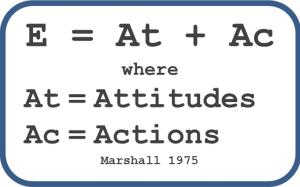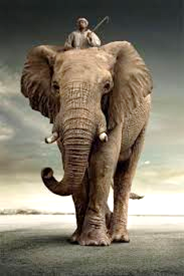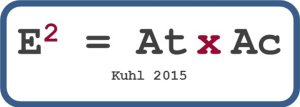As we saw with Talent, the word effort has an informal meaning; i.e., making a sincere attempt to do something by investing energy and hard work in achieving a result. More formally, in the language of the Performance Equation, Effort comprises two related sets of habits:
has an informal meaning; i.e., making a sincere attempt to do something by investing energy and hard work in achieving a result. More formally, in the language of the Performance Equation, Effort comprises two related sets of habits:
- Attitudes = habits of thought
- Actions = habits of behavior
Having a great attitude is a great start, but real value in life and work comes from translating that attitude into meaningful action. That’s the difference between having great potential versus delivering great performance. And achieving exponentially great performance is our aim, after all.
What do we mean by habits of thought? Imagine yourself diligently making your way through a typical day. As usual, stuff happens (to paraphrase a popular bumper sticker), and each time, you have the mental equivalent of a knee-jerk reaction in which you explain yourself to yourself.
 If you drop a freshly washed vase and it shatters to smithereens, you think, “Man, I am so clumsy!” Or perhaps you think, “Gosh, that wet vase was slippery.” You connect with a valuable business prospect and think, “I sure was lucky to stumble across that contact.” Or maybe you think, “My networking finally paid off.” You make a few flubs giving a presentation, and you think, “Next time, I’ll make sure somebody else gives the pitch.” Or you might think instead, “I’m starting to get the hang of public speaking. I’ll keep practicing until I’m more polished.”
If you drop a freshly washed vase and it shatters to smithereens, you think, “Man, I am so clumsy!” Or perhaps you think, “Gosh, that wet vase was slippery.” You connect with a valuable business prospect and think, “I sure was lucky to stumble across that contact.” Or maybe you think, “My networking finally paid off.” You make a few flubs giving a presentation, and you think, “Next time, I’ll make sure somebody else gives the pitch.” Or you might think instead, “I’m starting to get the hang of public speaking. I’ll keep practicing until I’m more polished.”
As you can see, the Attitude you express in the way you explain yourself to yourself has a huge impact on the Actions that you actually will do—your habits of behavior.
If you believe you can learn from mistakes, you’ll make a mental note to dry off wet glassware before moving it. But if you believe you’re just a klutz, well…too bad, nothing you can do. If you believe that your networking led to snagging a good prospect, you’ll redouble your efforts. But if it was just dumb luck, well…let’s keep our fingers crossed that it happens again. If you think that an old dog like you can learn new tricks, you’ll seek out opportunities to master new skills, knowledge, and abilities. But if you don’t, well…just avoid taking any chances or trying anything challenging.
To make things even more interesting, when you start talking about habits of thought and their impact on your habits of behavior, you encounter what is sometimes called the problem of “one brain, two minds.” Biologically, humans obviously have one brain, but when it  comes to decision-making—such as deciding what actions to take—the brain has two distinctly different systems in play: the rational system, and the emotional system. Each system has different strengths and weaknesses, and both are crucial to survival and success.
comes to decision-making—such as deciding what actions to take—the brain has two distinctly different systems in play: the rational system, and the emotional system. Each system has different strengths and weaknesses, and both are crucial to survival and success.
Author and psychologist Jonathan Haidt presents a wonderfully helpful analogy in his book, The Happiness Hypothesis, and the Heath brothers (Chip and Dan) popularized it further in their book, Switch: How to Change Things When Change is Hard. Put succinctly, imagine that your brain is a Rider sitting high atop an Elephant. The Rider represents the rational systems; the Elephant, the emotional systems. They have to work together to get anywhere.
This rational system/emotional system concept is a massive topic, and we’ll be coming back to it frequently and in greater detail as we go along. Until then, you might enjoy this 2-minute video, “The Rider, The Elephant, and The Path.” And keep in mind that when we talk about improving performance and increasing well-being, the implication is that we are changing from a current state to a desired future state.
As my friend and colleague Sam Yankelevitch would say, “This is just the tip of the tip of the iceberg!” As our journey to exponential performance continues, we’ll invest significant effort in understanding Effort. Recent research in neuroscience and psychology offers staggering amounts of information about the interactions of Attitude and Action!
 But for now, let’s return to the task of defining exponential performance. You raise the power of your Effort when you consciously optimize your habits of thought (a.k.a. attitude—At) by aligning the rational systems with the emotional systems, and then use those habits of thought to drive your habits of action (Ac) in ways that move you toward your goals.
But for now, let’s return to the task of defining exponential performance. You raise the power of your Effort when you consciously optimize your habits of thought (a.k.a. attitude—At) by aligning the rational systems with the emotional systems, and then use those habits of thought to drive your habits of action (Ac) in ways that move you toward your goals.
Back in that mind-blowing Philosophy 101 class from my Furman days, we wrestled with the concept of The Self. One of the great thinkers we studied was Rene Descartes, who is known for, among his many, many accomplishments, asserting, “Cogito, ergo sum” (“I think, therefore I am”). With sincere apologies to Rene and Drs. Edwards and McDonald, I hereby characterize Effort as “Cogito, ergo actus”—“I think, therefore, I take action.”
My next action? Create a post addressing the third element of the Performance Equation: Opportunity. What is it? And is it knocking?
~~~